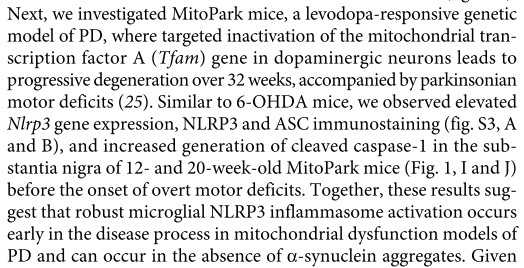I was reading this scientific article that was mentioned in a preceding post.
ncbi.nlm.nih.gov/pubmed/303...
I was interested to read that they worked with two mouse models of PD. One strain of mice had clumping of alpha-synuclein fibrils that led to Parkinson's symptoms. The other strain of mice did not have alpha-synuclein clumping, but had problems with the mitochondria. These also exhibited Parkinson's symptoms.
I did a screenshot to quote a relevant part from the body of this paper.
Judging from how things manifest in mice, it looks like Parkinsonian disease can be caused by alpha synuclein clumping, or by genetic problems with mitochondria. This was news to me. I suspected as much, but this is evidence.
